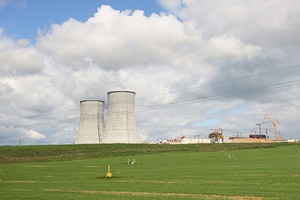Ru
|
Eng
Belarusian nuclear power plant can reduce electricity rates for production sector by 30%
30.05.2017

Electricity rates for the production sector may be reduced by 30% after the Belarusian nuclear power plant goes online. Deputy Prime Minister of Belarus Vladimir Semashko made the statement during the international conference of the World Association of Nuclear Operators (WANO) held on 30 May to discuss support for new power-generating units of nuclear power plants, BelTA has learned.
The official said: “Once the nuclear power plant goes online, we intend to reduce the average tariff of 11.3 cents per kilowatt hour (it is a very costly tariff, our industry and the real sector of the economy suffer a lot from it) to 7.9 cents per kilowatt hour. It is a very serious shift. We intend to reach this goal. It is absolutely doable.” Tariffs in Russia will be at 7.5-7.8 cents per kilowatt hour while tariffs in Europe will be close to 11 cents per kilowatt hour. The tariffs will be reduced not only thanks to the launch of the nuclear power plant but also thanks to the set of measures designed to develop the Belarusian power grid as a whole.
Apart from that, the lower prime cost of electricity generation will allow pursuing a balanced policy with regard to electricity tariffs for Belarusian households. “In addition to resolving the problem for the real sector of the economy — industry, agriculture, transport — we will accomplish a social and political task. Cross-subsidizing is in place for now. We need households to pay for 100% of the cost of utilities. If the prime cost of electricity is reduced, we will not have to raise tariffs by several times to achieve full compensation,” said Vladimir Semashko.
Asked about a possible surplus of electricity after the nuclear power plant goes online, the official noted that the Belarusian nuclear power plant was initially intended to address domestic needs only, electricity export was off the table. Vladimir Semashko pointed out that with the nuclear power plant online, Belarus will be able to diversify its sources of energy. The accomplishment is of strategic importance for the country. “At present natural gas is used to generate 95% of the electricity. It is a dangerous dependence even if we buy gas from the friendly and brotherly country of Russia. Once the nuclear power plant goes online, nuclear energy will account for 27-28% of the electricity generated in Belarus,” said the deputy prime minister.
The Belarusian nuclear power plant is a project to build a new-generation nuclear power plant with two VVER-1200 type reactors (1,200MW each) 18km away from Ostrovets, Grodno Oblast. The first power-generating unit is scheduled for commissioning in 2019, with the second one to go online in 2020.
NEWSWIRE
17.07.2024
02.07.2024
27.06.2024
21.06.2024
19.06.2024
06.06.2024
06.06.2024
06.06.2024
06.06.2024
06.06.2024













